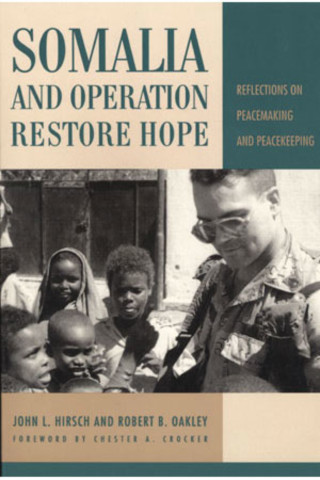Somalia and Operation Restore Hope
The Los Angeles Times describes this volume as one of the two most important postmortems written since the United Nations dismantled its troubled and lamented mission to Somalia.
“Somalia” has become a symbol for the unacceptable costs of humanitarian intervention, for the type of foreign involvement that should be avoided. But the authors of this timely book, themselves key participants in the U.S.-led operation there, argue that substantial good was done—the tide of famine was stayed, hundreds of thousands of lives saved, and steps toward political reconciliation begun. Despite the recent renewal of political violence, the humanitarian situation remains stable.
In launching Operation Restore Hope, the multinational coalition faced a complex, tense, and rapidly unfolding situation. The authors detail how the carefully limited mission achieved its goals, including mutual understanding with the Somalis, by combining political, military, and humanitarian actions. But the authors also describe how different U.S. and UN concepts of the mission and subsequent changes in the mission’s scope led almost inevitably to confrontation.
This candid statement of the political dilemmas and operational problems that arise during UN peace operations makes a significant contribution toward the effective conduct of future such operations.
- National Security Law Report
This extremely useful book. . . sets the record straight by pointing out what was accomplished by the U.S. and international community in Somalia without glossing over the mistakes.
- Parameters
Robert B. Oakley
Robert B. Oakley was U.S. special envoy to Somalia under President Bush and Clinton. Previously, he was coordinator of the Institute's Middle East program.
John L. Hirsch
John L. Hirsch is currently a Senior Adviser to IPI President Terje Rød-Larsen after having held various positions at IPI, including Vice President and Acting Head of the Africa Program. He is also Adjunct Professor at Columbia University’s School of International and Public Affairs (SIPA) and served as Director of the Occidental College United Nations Program from 2002-2011.
Before joining IPI, Ambassador Hirsch served as United States Ambassador to the Republic of Sierra Leone from 1995-1998. His extensive African experience includes assignments in Somalia from 1984-1986, and subsequent roles as Political Adviser to the Commander of UNITAF, General Robert Johnston, and as Deputy to President Bush’s Special Envoy, Ambassador Robert Oakley from 1992-1993.
Ambassador Hirsch served as Consul General in Johannesburg, South Africa from 1990-1993, the years of transition from apartheid to non-racial multiparty democracy. His earlier assignments in Israel at the start of the Middle East peace process in the mid-seventies and, subsequently, at the US Mission to the United Nations and in Pakistan have dealt with major issues of multilateral diplomacy and United Nations peacekeeping.
Ambassador Hirsch was a Senior Fellow at the Council on Foreign Relations in 1993 and 1994 and Diplomat-in-Residence at Medgar Evers College, City University of New York, from 1994-1995. He was Director of the International Fellows Program at Columbia University’s School of International and Public Affairs for the 2000-01 academic year.
Ambassador Hirsch received his BA in American studies from Columbia University in 1957 and his PhD in European history from the University of Wisconsin in 1965. He was a Fulbright Scholar in Turin, Italy, in 1962 and 1963, where he wrote a dissertation on the Italian Resistance Movement and its impact on postwar Italian political developments.

